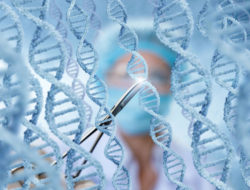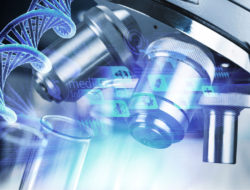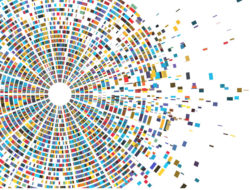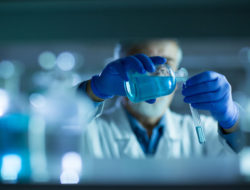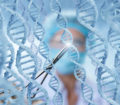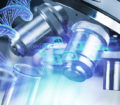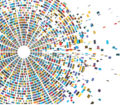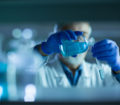When Eduardo Esquenazi was 28, he abruptly went from being a semiprofessional surfer and UC San Diego doctoral student to a patient at Memorial Sloan Kettering Cancer Center in New York.
Diagnosed with testicular cancer, Esquenazi put his neurobiology studies on hold to embark on an intense treatment plan that included multiple rounds of chemotherapy. It turned his world upside down, but it saved his life—and also gave him the idea for an unusual biotechnology company that could one day save the lives of many others.
Today, Esquenazi is CEO of Sirenas, a San Diego company that explores the ocean for molecules that can cure human diseases. His team has collected hundreds of sponges, algae, and other organisms from remote waters all over the world. Several of these samples have shown to be potential leads for cancer drugs, and one recently discovered specimen shows promise against malaria, a disease that killed upward of 430,000 people last year. The discovery caught the attention of the Bill & Melinda Gates Foundation, which awarded Sirenas a $775,000 grant in September.
None of it would have happened if Esquenazi’s life had stayed on track in 2002.
“Cancer shakes you up in a lot of ways,” he says. “I started thinking about what I really wanted to do with my life if I got better. As much as I loved neurobiology, I realized I didn’t want to continue with it. I thought: I love the ocean, I love science. So what can I do with that?”
A Road to San Diego
Esquenazi’s love for the ocean, and what lies beneath its surface, began during his childhood in Colombia.
At the age most kids learn to ride a bike, Esquenazi was strapping a scuba tank on his back, guided by his father, an experienced diver. He was entranced by the variety of sea life he’d encounter in the Caribbean waters—by how they all share a certain core biology but are also vastly different in ways that give them an edge for survival.
When Esquenazi was eight years old, Colombia’s growing political conflict led his mother to leave the country with him and his two older siblings, settling in Florida. He learned to surf, continued to dive, and became relentlessly focused on the Darwinian magic of life that had hooked him years earlier.

Photo by Jay Reilly
His passion led him to a degree in biology and neuroscience from Vanderbilt University in Nashville, Tennessee (a bit too far from the ocean for his liking) and eventually to San Diego, where he would pursue doctorate research in neurobiology. Two years into his PhD program, he received the diagnosis that changed everything.
Nature’s Healing Power
While undergoing cancer treatment at Sloan Kettering, Esquenazi found himself dwelling on how two of the powerful drugs he was taking—Taxol and bleomycin—were both derived from plants. In fact, 60 percent of all FDA-approved medicines and nearly half of all cancer therapies are modeled after naturally occurring molecules, including morphine (from the opium poppy plant) and over-the-counter drugs like aspirin (willow tree bark) and Sudafed (ephedra plant).
Esquenazi thought of all the time he’d spent in underwater forests and reefs filled with millions of awe-inspiring yet little-studied organisms. What if molecules from these life forms could become the next taxol? Or better yet, a taxol that didn’t come with such horrid side effects?
“Most of life on this planet is at the microscopic level,” he says. “As humans, we’re egocentric and we believe that life is what we see. But the vast majority is what we don’t.”
Esquenazi became determined to start a company that searches the sea for new medicines. He spent his time doing research and talking with former colleagues and professors. The plan was set: As soon as he was healthy, he would return to San Diego and become an expert in the scientific field known as “marine natural products.”
Getting Back in the Water
With more than 18 months of treatment behind him, Esquenazi was accepted as a doctoral student at the Center for Marine Biotechnology and Biomedicine, part of UCSD’s Scripps Institution of Oceanography. He worked alongside some of the best-known researchers in his new field, including professor Bill Gerwick.
“Ed has a quiet, gritty determination about him,” says Gerwick, who describes Esquenazi as a remarkably modest, productive scientist. “He’s been able to bridge different disciplines to make connections that hadn’t been there before.”
Nearly half of all cancer therapies and 60 percent of all FDA-approved medicines are modeled after naturally occurring molecules, including morphine (from the opium poppy), aspirin (willow tree bark), and Sudafed (ephedra plant).
With an urgency that could be expected of someone who’d just confronted his own mortality, Esquenazi completed his PhD in three years and racked up a dozen journal articles on the discovery of new anticancer, antimicrobial, and anti-inflammatory compounds from marine organisms. Just for fun, he also helped create and launch a top-rated iPhone surfing app, SurfExplorer USA.
He graduated in 2010 and launched his company the next year, joined by cofounders Jake Beverage from Genentech and Phil Baran, a synthetic chemist and MacArthur Fellow at The Scripps Research Institute.
Today, from the Sirenas headquarters (just a few minutes from some of San Diego’s best surfing spots), Esquenazi orchestrates four diving expeditions a year to isolated waters. He and a small team don scuba gear and meticulously collect samples of sponges and algae in quart-size Ziploc bags. Then they vacuum-seal and freeze the samples for analysis back at the lab in San Diego.
“A sponge or algae isn’t just one organism; it’s an apartment complex of organisms, each with a plethora of chemicals it uses to communicate and manage its world,” Esquenazi explains.
Sirenas captures the unique chemical signatures from every creature and uses its data-mining program, Atlantis, to find potential disease targets. Once a match is tested and confirmed, the chemistry team, led by Baran, sythesizes the molecule, eliminating the need to take more of the organisms from the wild.

The Sirenas team meets the sub on its way to the surface. | Photo by Barry Brown, Coral Reef Photos
Just a month after the company’s first diving trip—a 2012 expedition to Puerto Rico—Sirenas identified molecules with potential as a targeted cancer drug. Another big victory came in 2014, when Sirenas secured a government grant of nearly $300,000 to develop a potential breakthrough HIV drug discovered from a marine sponge in Indonesia. Currently, Sirenas is applying its discovery platform to neglected diseases, aided by the Gates Foundation grant, and to the fast-growing field of immuno-oncology. Both have already yielded a host of new discoveries.
In March he will appear alongside conservationist Fabien Cousteau, grandson of Jacques-Yves Cousteau, at the South by Southwest convention in Austin, Texas, to speak about the dire need for ocean preservation.
But it’s not all business. Esquenazi, cancer free for more than a decade, keeps his surfboard in his office and still makes time to dive for the pure fun of it. The La Jolla resident, who recently celebrated his first wedding anniversary, visits his home country about once a year to see family and enjoy the warm waters of his youth.
Still, he can’t help but get sidetracked by the sight of an unusual blue-green algae he’s never seen before. “I’m always super happy to be in the water. It feels like home,” he says. “I’m always thinking about this thing that I’m collecting and what its future impact might be. You never know what the next discovery will hold.”
Tags: Features, Medical Research, Medicine











